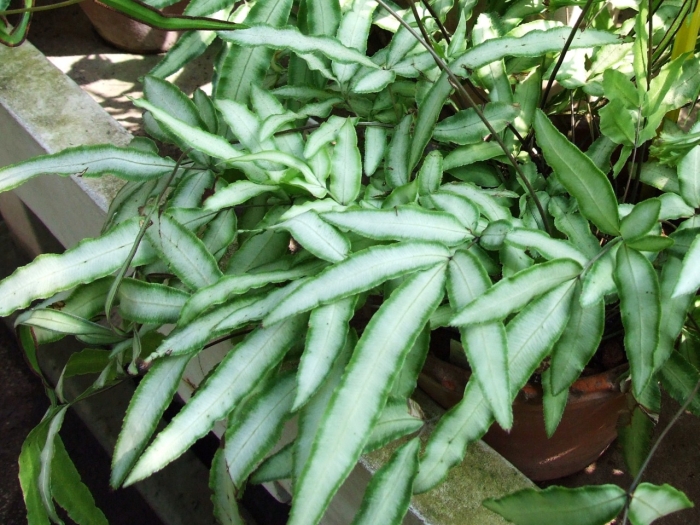Cretan Brake
(Pteris cretica)
Cretan Brake (Pteris cretica)
/
/

Jerzy Opioła
CC BY-SA 4.0
Image By:
Jerzy Opioła
Recorded By:
Copyright:
CC BY-SA 4.0
Copyright Notice:
Photo by: Jerzy Opioła | License Type: CC BY-SA 4.0 | License URL: https://creativecommons.org/licenses/by-sa/4.0 | Uploader: Selso | Publisher: Wikimedia Commons | Title: Pteris_cretica_'Albo-lineata'_a1.jpg | Notes: Transferred from Flickr via [[Commons:Flickr2Commons|Flickr2Commons]] |

















































Estimated Native Range
Summary
Pteris cretica, commonly known as Cretan Brake, is an evergreen fern native to a variety of habitats including rocky slopes, crevices, and shaded woodlands in Southern Europe, South and East Africa, Madagascar, and South and East Asia. It typically grows to 75 cm (30 in) tall by 60 cm (24 in) broad, featuring arching pinnate fronds with up to five pinnae, which give it a delicate, feathery appearance. The fronds are light green, and the plant is known for its ease of maintenance and tolerance of a wide range of conditions.
Cretan Brake is valued for its attractive foliage and versatility in cultivation. It is used in gardens both in-ground and as a potted plant, and it is popular as a houseplant. The variegated variety, Pteris cretica var. albolineata, is particularly sought after for its ability to brighten shaded garden areas. Both types are well-suited to subtropical climates and can be grown year-round outdoors in regions like California. They require protection from frost, with a minimum temperature of 2 °C (36 °F). The species is more cold-tolerant and can be grown outdoors in summer in cooler climates. It prefers part shade or full shade, medium water, and soils with slow to medium drainage. Popular garden cultivars include ’Albolineata’ with its white-striped fronds and ’Wilsonii’ with feathery, highly divided pinnae. Pteris cretica can become invasive in some regions, such as Ireland, Peru, California, Florida, and Illinois, so it is important to check local guidelines before planting.CC BY-SA 4.0
Cretan Brake is valued for its attractive foliage and versatility in cultivation. It is used in gardens both in-ground and as a potted plant, and it is popular as a houseplant. The variegated variety, Pteris cretica var. albolineata, is particularly sought after for its ability to brighten shaded garden areas. Both types are well-suited to subtropical climates and can be grown year-round outdoors in regions like California. They require protection from frost, with a minimum temperature of 2 °C (36 °F). The species is more cold-tolerant and can be grown outdoors in summer in cooler climates. It prefers part shade or full shade, medium water, and soils with slow to medium drainage. Popular garden cultivars include ’Albolineata’ with its white-striped fronds and ’Wilsonii’ with feathery, highly divided pinnae. Pteris cretica can become invasive in some regions, such as Ireland, Peru, California, Florida, and Illinois, so it is important to check local guidelines before planting.CC BY-SA 4.0
Plant Description
- Plant Type: Fern
- Height: 1-2 feet
- Width: 1-2 feet
- Growth Rate: Moderate
- Flower Color: N/A
- Flowering Season: Non-Flowering
- Leaf Retention: Evergreen
Growth Requirements
- Sun: Part Shade, Full Shade
- Water: Medium
- Drainage: Slow, Medium
Common Uses
Deer Resistant, Low Maintenance, Rabbit Resistant, Rock Garden
Natural Habitat
Native to rocky slopes, crevices, and shaded woodlands in Southern Europe, South and East Africa, Madagascar, and South and East Asia
Other Names
Common Names: Ribbon Fern, Cretan Brake Fern, Kantbräken, 큰봉의고사리, 큰봉의꼬리, 大葉鳳尾蕨
Scientific Names: , Pteris cretica, Pteris cretica var. cretica, Pteris cretica subsp. laeta, Pteris laeta var. latifolia, Pteris trifolia,
GBIF Accepted Name: Pteris cretica L.